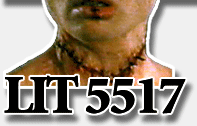|
|
LIT 5517-01: Studies in Gender
Dr. Caroline Joan (Kay) Picart
6:45-8 p.m., TTH, Williams 116
6-8 p.m., W, Williams 013 (optional tech training and viewing)
Fall Term, 2006: August 28-December 15, 2006
Consultation: 2-3 p.m., TTH, Williams 453
Course Description:
This course takes as its center the issues of gender and authority in relation to the politics of representation, as manifested in texts, broadly defined, whether they be in science, art, literature or law. These issues are pivotal to debates in contemporary feminist theory and the philosophy/sociology of science. Conventionally, issues of feminism and science, and gender and art have been pursued as separate areas of inquiry. What such an approach obscures, however, are the natural intersections and common themes that bind the epistemologies, politics and ethics of scientific and artistic activities.
Among the crucial questions are: How is authority established in texts? How do the artistic conventions and popular views of science continually come together to regenerate the Frankenstein myth—a myth of male self-birthing, steeped in anxieties concerning the control of nature, technology, and the “feminine other”? How does one de-center the subject of Enlightenment science, the “neutral” voice of law, and Romantic or colonial art? In what ways has the historical exclusion of women from the spheres of science, law and “high” art contributed to the rise of patriarchy? How does one move from a politics of exclusion to one of integration? What historical cases illustrate the correlation between scientific, artistic, legal and literary representations and the resultant political and economic hierarchies, differentiated along gendered, racial, and class lines? Is there such a thing as an essentially “feminine” type of science, art, law or literature? How has nature been gendered in both science, literature, law and art? Can one make an argument for a distinctively “feminist” epistemology based on biological or sociological grounds, rooted in representations in/of science, literature, law and art? What would be the conditions of possibility within which one could speak of a “feminist” ethics related to these spheres? What feminist strategies can be employed to move towards a more just and humane world, particularly as rooted within scientific, legal, literary and artistic modes of production, expression, and consumption?
Traditional political theory links the issue of author-ity with the entitlement to speak, and conventional modes of representation in both science and art have implicitly set up standards of who is speaking versus who listens; who dissects and who is dissected; who gazes, and who is gazed upon. In contrast, feminist critiques have focused on destabilizing and unmasking the complex genealogies that underlie traditional assumptions concerning who may speak to/about/for whom or what. Thus, scientific and artistic representations, as gendered and historical configurations of power rooted in specific cultural and economic contexts, constitute a particularly fertile ground for examining and re-envisaging the nature of authority, and of recognizing and redirecting the political nature of representation in science, art, literature and law.
|
|
|



